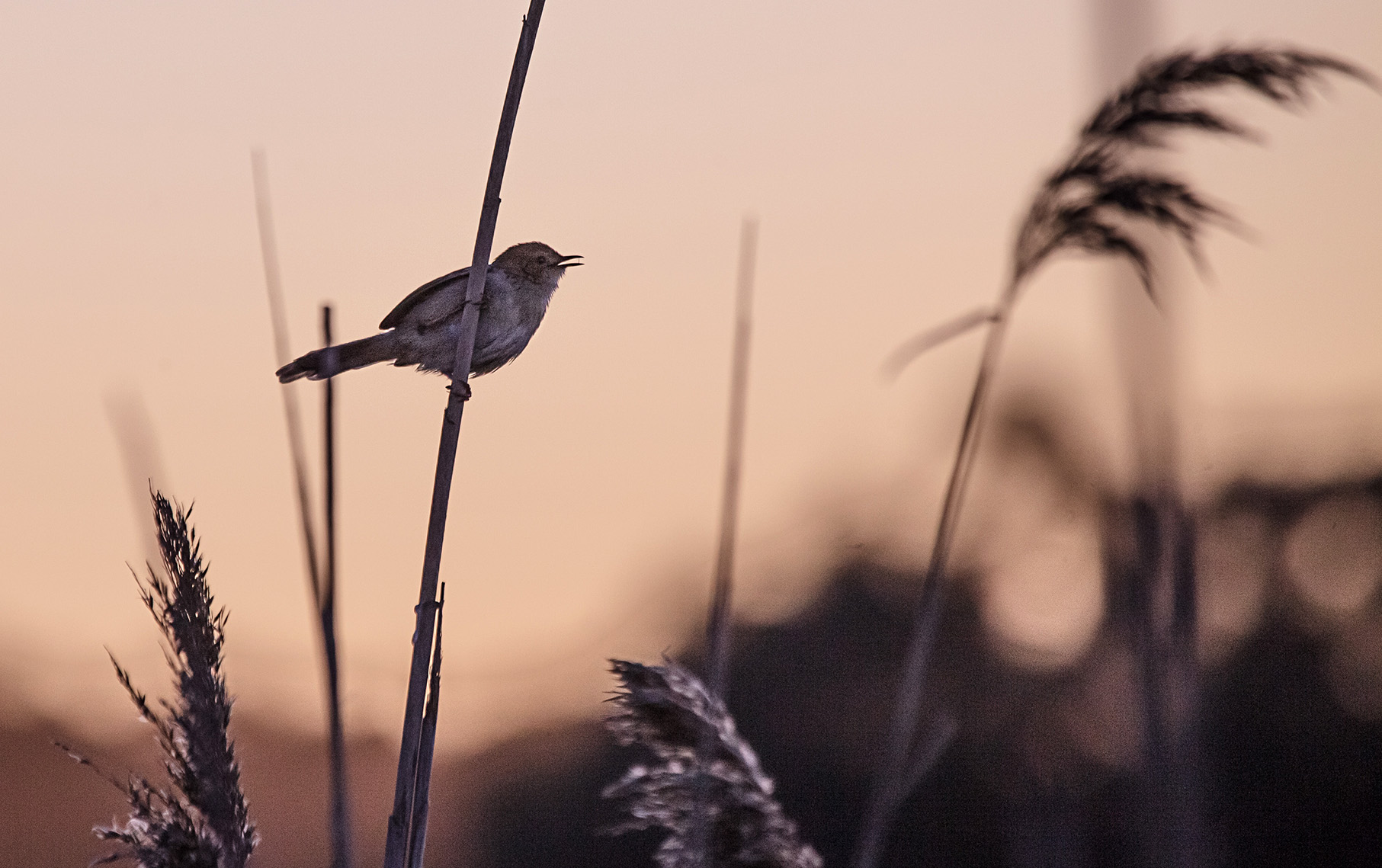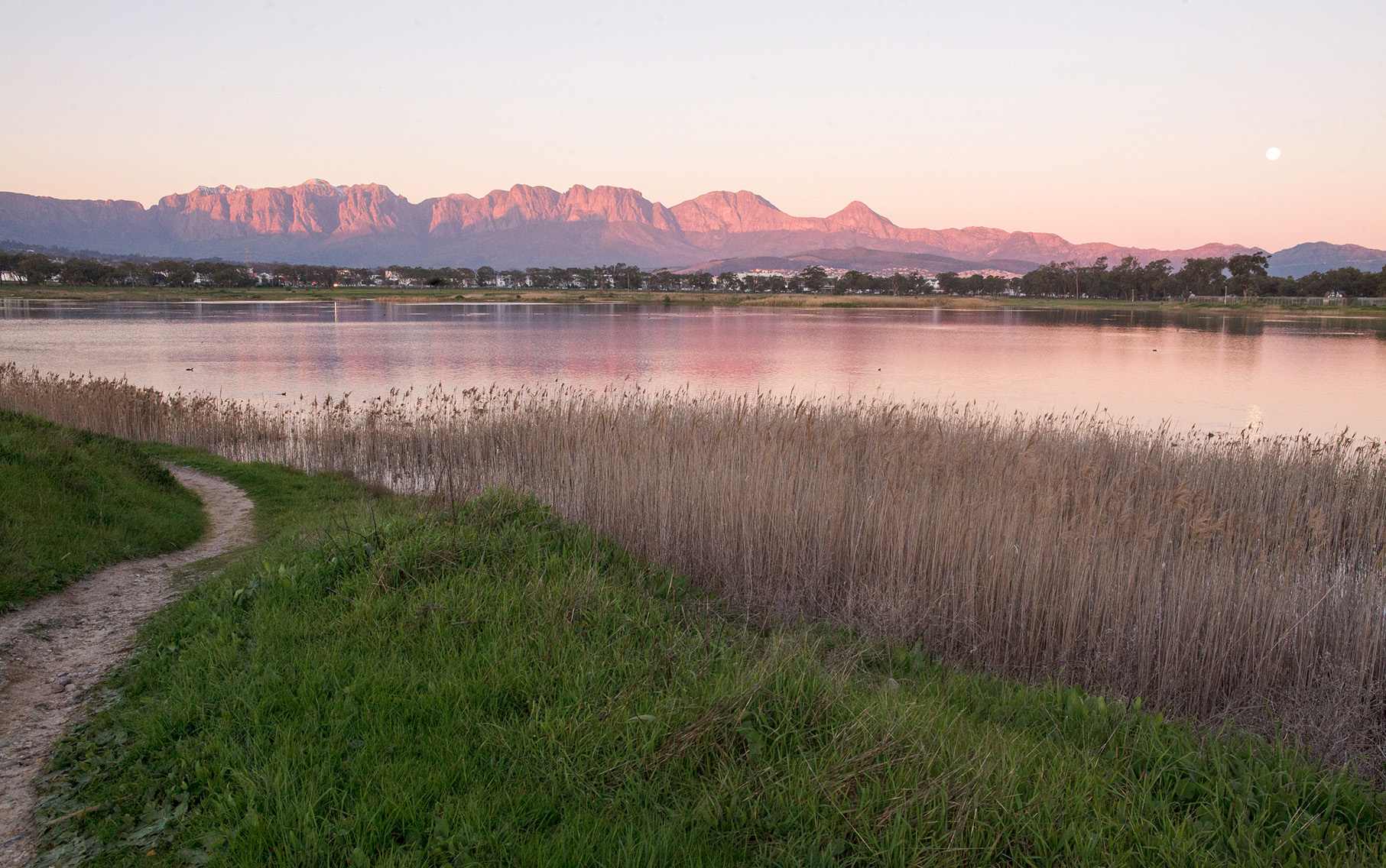In a bid to balance biodiversity conservation with growing housing needs, a proposal is now on the table to proclaim the Paardevlei wetland in Strand as Cape Town’s 23rd nature reserve, alongside plans to develop affordable housing adjacent to the site.
The site is home to several endangered and threatened species such as the Maccoa duck, blue crane, greater and lesser flamingo and the Cape dwarf chameleon. The proposed housing development initially drew concerns from a variety of stakeholders, which effectively led the city’s Biodiversity Management Branch (BMB) to make the conservation proposal.
 Almost 200 bird species, including greater and lesser flamingos, have been recorded at Paardevlei wetland in Strand, Cape Town. (Photo: Tiffany Schultz)
Almost 200 bird species, including greater and lesser flamingos, have been recorded at Paardevlei wetland in Strand, Cape Town. (Photo: Tiffany Schultz)
 Paardevlei wetland in Strand, Cape Town (Photo: Tiffany Schultz)
Paardevlei wetland in Strand, Cape Town (Photo: Tiffany Schultz)
Alex Lansdowne, chair of the mayor’s Section 80 Advisory Committee on Water Quality in Wetlands, Waterways and the Coastal Environment, said there was consensus within the committee that it was feasible and worthwhile to give protected area status to the Paardevlei wetland, as an unexpected outcome of the process to develop adjacent land for affordable housing.
The City of Cape Town purchased the 688ha site in 2015 for R400-million using Human Settlements Grant funding for housing. It was formerly owned by African Explosives and Chemical Industries (AECI) and then its subsidiary Heartland Properties.
Of the 688ha, 317ha (46%) is developable and earmarked for “sustainable and integrated human settlements development”, part of the city’s plan to release well-located state-owned land for affordable housing. About 70ha along the western edge has also been reserved for a solar PV farm.
Precinct 2 of the developable 317ha site, spanning 101.36ha around the vlei, is up for sale for affordable housing and mixed development.
 Proposed Paardevlei Nature Reserve site. The black line on the map marks the 101.36ha proposed for sale. (Photo: City of Cape Town)
Proposed Paardevlei Nature Reserve site. The black line on the map marks the 101.36ha proposed for sale. (Photo: City of Cape Town)
The city’s Biodiversity Management Branch wants to retain 27ha of this in city council ownership, comprising 14ha in the flood-prone area and 13ha of the terrestrial habitat to be included in the nature reserve area.
This was announced during a recent meeting of the Section 80 Advisory Committee, along with a presentation by the Human Settlements directorate on the disposal of the land and the updated operational environmental management plan.
Support from conservationists
The city’s proposal to declare Paardevlei a nature reserve has garnered support from BirdLife South Africa, the Cape Bird Club and the Friends of Paardevlei group.
According to BirdLife South Africa, Paardevlei is an important avifaunal habitat, providing foraging and breeding grounds for a variety of resident and migratory birds. Well over 200 species including numerous species of ducks, terns, teals, herons and flamingos have been recorded at the site.
 Paardevlei wetland in Strand, Cape Town is popular birding site with many endemic Cape species. Almost 200 bird species have been recorded. (Photo: Mike Buckham)
Paardevlei wetland in Strand, Cape Town is popular birding site with many endemic Cape species. Almost 200 bird species have been recorded. (Photo: Mike Buckham)
 Paardevlei is an important avifaunal habitat, providing foraging and breeding grounds for a variety of resident and migratory birds. (Photo: Tiffany Schultz)
Paardevlei is an important avifaunal habitat, providing foraging and breeding grounds for a variety of resident and migratory birds. (Photo: Tiffany Schultz)
 Almost 200 bird species including numerous species of ducks, terns, teals, herons and flamingos have been recorded at Paardevlei Wetland in Strand, Cape Town. (Photo: Tiffany Schultz)
Almost 200 bird species including numerous species of ducks, terns, teals, herons and flamingos have been recorded at Paardevlei Wetland in Strand, Cape Town. (Photo: Tiffany Schultz)
“We’ve had a nesting pair of blue cranes there for a few years and the struggle is that because (the site is) not currently protected, this pair try to raise young every single year and they’ve never survived because there’s no management. We have people walking dogs and that sort of thing, which has resulted in a struggle for that species in particular to thrive there,” Tiffany Schultz told Daily Maverick.
Schultz is a birder and chair of the Friends of Paardevlei, a group of residents of the Helderberg who have been working to restore and protect this little piece of natural habitat.
When it became known that the site was being made available for development, the group set up a petition to protect the Paardevlei wetland and its ecosystem by zoning it as a conservation area.
Schultz said this came as the area faced a major threat from new developments that were planned to surround it. The petition states that the approved development of Precinct 2 in Paardevlei would profoundly affect its wildlife habitat.
Should the current negotiations fail, Schultz said it would be devastating because of all the development already happening there and the associated ecological impact.
“We have such an issue with flooding in our area already. Sewage is a massive concern, we have overflow every single time it rains,” she said.
Schultz said that the city should try to preserve and restore the wetlands that were there to help manage that water more effectively so that the flooding could be mitigated naturally.
Mike Buckham, chair of the Cape Bird Club, said if this proposal was successful, it could also be a chance to provide environmental education and opportunities for people living in affordable housing areas to enjoy the green spaces on their doorstep.
Housing for the site
Mayoral Committee Member for Human Settlements Carl Pophaim told Daily Maverick the city was compelled to use the property for housing as its purchase was funded by the Human Settlements Grant.
“But I accept for the Helderberg region the need to prioritise sustainable, integrated living, particularly conservation areas, so we have through the Section 80 committee and the line departments, found each other on the basis of continuing with the proposed affordable housing,” he said.
They are now looking to subdivide the wetland area, inclusive of a broader buffer zone for conservation purposes.
“We still need to operationalise as to what that looks like post subdivision in terms of management. The city will retain its ownership and we are looking at ceding the development rights and the management of [the wetland] to our colleagues in the BMB,” he said.
Pophaim said this would be the first affordable housing project in Cape Town that would take place in conjunction with a nature reserve.
Looking ahead, the city is looking to advertise the sale of the land this year, and then begin public participation in the new year. However, that does not stop the potential subdivision process for the conservation area from happening sooner.
Site history and rehabilitation
Clifford Dorse, head of conservation services in the city’s Biodiversity Management Branch, said initially the area would not warrant nature reserve status, but that the site had increased substantially in its biodiversity value over the years – especially since 2011, as they gave the land time to recover from work done by the previous owner and for rehabilitation to be completed.
See here a comparison between Paardevlei in 2011 and 2023.
The proposed disposal of 101.36ha was right up to the edge of the vlei itself, which the Biodiversity Management Branch had noticed and had also led to the petition by the Friends group.
On the ecological and biodiversity significance of preserving the site, the Biodiversity Management Branch confirmed that Paardevlei wetland was home to several threatened and endangered fauna including birds, mammals and reptiles such as the African marsh harrier (endangered), the greater flamingo (near threatened), and the Cape clawless otter (near threatened).
“This is not just another stormwater pond. It really is a wonderful birding locality and a biodiversity locality. The fact that it dries out annually (because it is a seasonal wetland), or close to dries out, is fundamental to its functionality,” Dorse said.
Dorse said there were several other benefits to preserving the isolated wetland. For one, the platanna migration happens every year where the frogs from Paardevlei cross the busy R44 road to the big ponds at the mall there.
“It’s carnage and a lot of frogs die… We would want to try and see if we could put in some suitable pans and habitat on the one side and put a frog-proof fence to help save them,” Dorse said.
Liz Day, a specialist freshwater ecologist, was commissioned by Human Settlements Planning to update the existing operational environmental management plan for the wetland and has been part of the rehabilitation since 2007, after the wetland had been affected by AECI.
 Paardevlei in May 2024 during draw-down, the most critical management tool for the vlei. (Photo: Liz Day)
Paardevlei in May 2024 during draw-down, the most critical management tool for the vlei. (Photo: Liz Day)
Day said AECI ceased operations in the early 2000s and the site was handed over to Heartland Properties, which initiated the rehabilitation into a seasonal wetland system, dominated by reed beds, known for their ability to filter pollution, that is managed so that water is drawn down.
“We took away the pollutants and managed the alien vegetation around the sides. It didn’t have new pollutants coming in, so basically we created the habitat so that the hydrological conditions allow the return of vegetation,” Day said.
The affordable housing as presented by the Human Settlements directorate at the meeting, Day said, would be compatible as long as it had appropriate levels of servicing, particularly around solid waste. DM
https://www.youtube.com/watch?v=REeWvTRUpMk




 Paardevlei in May 2024 during draw-down, the most critical management tool for the vlei. (Photo: Liz Day)
Paardevlei in May 2024 during draw-down, the most critical management tool for the vlei. (Photo: Liz Day) 